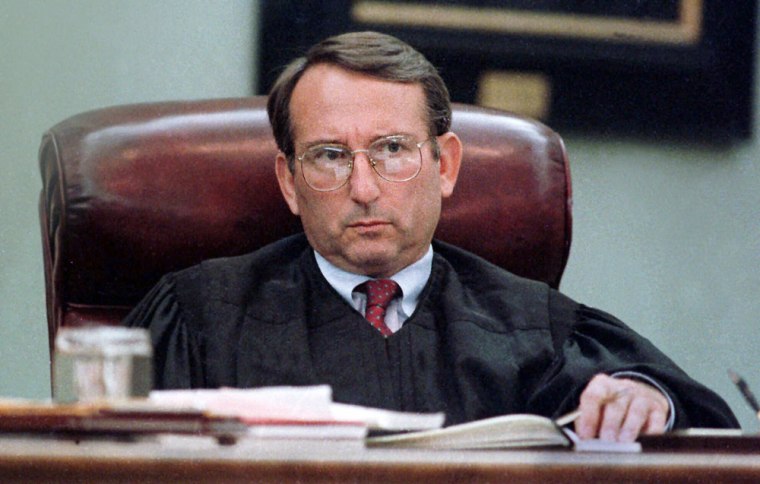A key overseer of the Bush administration’s unsuccessful efforts to create a more comprehensive screening process for airline passengers resigned in disgrace four years ago from the New Hampshire Supreme Court to avoid prosecution over his conduct on the bench.
W. Stephen Thayer III, who left New Hampshire’s high court in 2000 under a deal with prosecutors, is now serving as deputy chief of the Transportation Security Administration’s Office of National Risk Assessment.
Thayer resurrected his public career with a stint at a conservative political group in Washington before landing the job last summer where he oversees the administration’s Computer-Assisted Passenger Prescreening System. The project encountered such technical difficulty and so much resistance from privacy advocates that it was sent back to the drawing board earlier this month.
The project, which was known as CAPPS II, was to develop software to bar any passenger from getting on an airplane if a computer analysis of unidentified government terrorist watchlists and private commercial electronic records judged him or her to be a security threat. The project has been sharply criticized by congressional auditors.
The administration’s selection of Thayer — made with no fanfare last summer — has raised some eyebrows.
“To appoint someone who had to resign in public disgrace in lieu of being indicted is incredibly offensive,” said Charles Lewis, executive director the Center for Public Integrity, a private ethics watchdog. CAPPS II has been “one of the most sensitive projects in the U.S. government,” because “we are talking about data-mining the records of millions of Americans. The people in charge have got to be beyond reproach in every way.”
Thayer declined to be interviewed.
Conservative task force
But TSA spokesman Mark Hatfield said Thayer was qualified for the job because he helped the American Conservative Union organize a task force with other conservative and liberal groups, including the American Civil Liberties Union, to lobby on the government’s handling of citizens’ personal information, including CAPPS II.
“That was as direct involvement in that field as you can get,” Hatfield said.
Hatfield said the New Hampshire controversy was reviewed by those who appointed Thayer and posed no bar to his getting the federal job because no charges were filed and no action was taken against him by the state judicial conduct committee or the bar association.
“He faced the allegations for a significant time and significant cost, and at some point he chose to withdraw from the battle as it was in the best interests of himself and his family,” Hatfield said.
Months behind schedule, the two-year-old CAPPS II was sharply criticized in February by the Government Accountability Office, the auditing arm of Congress, for failing to fully address seven of eight targets for accuracy, privacy and security.
Concerned that the program would invade privacy and leave air travelers with no way of correcting its errors, Congress has prohibited the program’s deployment until those benchmarks are met. Earlier this month, Transportation Security Administration chief David Stone told Congress the program is being “reshaped and repackaged.”
Thayer’s fast-moving legal career — U.S. attorney at 35, state supreme court justice at 40 — came to an abrupt halt on March 31, 2000, when he resigned from the state’s highest court in a deal with New Hampshire Attorney General Philip McLaughlin.
‘Hang together ... or hang separately’
In return for Thayer’s resignation, McLaughlin agreed to drop plans to indict him. In a public report, McLaughlin criticized Thayer for participating in deliberations on a case he was recused from. He also said he would have sought felony or misdemeanor charges against Thayer for allegedly trying to influence the choice of a judge to hear his wife’s appeal of their divorce and threatening fellow justices if they allowed his conduct to be reported to judicial oversight groups.
McLaughlin’s report said Supreme Court Justice John T. Broderick quoted Thayer as saying if his conduct were reported to oversight groups “I’m done. It’s over for me .... We all do it. We can either hang together on this or hang separately.” Chief Justice David Brock said Thayer told him, “I’m not going to hang alone.”
Thayer insisted at the time, “I committed no criminal act.” But McLaughlin had decided to seek the criminal indictment when Thayer volunteered to resign.
Two years after the episode, McLaughlin wrote Thayer in December 2002 and cited Thayer’s reputation for scholarship and fairness as a judge. He added that during the investigation, Thayer acted “in a most professional, forthright and honest manner.” But McLaughlin did not back off his findings, noting his report “will be a matter of public record forever.”
No biography
In a rare public appearance last fall, Thayer did not supply a biography like other witnesses who testified before a Pentagon advisory committee on privacy and computerized data-mining.
When asked about his qualifications to supervise CAPPS II, Thayer said then he had been executive director of a nonprofit group that reviewed privacy rights in post-Sept. 11 legislation and was a lawyer and former U.S. attorney. He made no mention of his 14 years on New Hampshire’s highest court.
On May 26, 2000, while trying to get his alimony and child support reduced from almost $36,000 a year to $6,000 a year, he told a New Hampshire court he had had trouble finding work after his Supreme Court resignation.
“Large law firms are not into risk. They do not want my name associated with them so long as we have this kind of publicity in New Hampshire,” he said, according to the Portsmouth, N.H., Herald.
